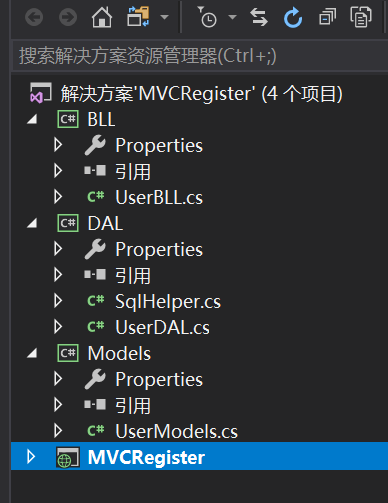Asp.net mvc+三层架构(注册篇)
坑:从数据库加载出的数据需加.Trim()去掉空格符,否则匹配不成功
先搞个简单的SQL数据库名为MVC, 新建表UserInfo
Id主键,int型,自增1;
UserName,char型;
PassWord,char型;
注意:表的名称不要取user,因为与vs关键字有冲突,会报错(尴尬地笑了一下)
项目结构:

1.新建一个名为MVCRegister的应用程序,并选择mvc框架
2.分别建立DAL,BLL,Models类库,再在DAL类库下新建sql帮助类SqlHelper.cs
再在MVCRegister的目录下的右键添加引用,在“程序集”勾选System.Cofiguration


1 using System; 2 using System.Collections.Generic; 3 using System.Linq; 4 using System.Text; 5 using System.Threading.Tasks; 6 using System.Data.SqlClient; 7 using System.Configuration; 8 using System.Data; 9 using System.Collections; 10 11 namespace DAL 12 { 13 14 public class SqlHelper 15 { 16 17 public static string connString = ConfigurationManager.ConnectionStrings["connString"].ToString(); 18 public static int ExecuteNonQuery(string connectionString, CommandType commandType, string commandText, params SqlParameter[] commandParameters) 19 { 20 SqlCommand cmd = new SqlCommand(); 21 using (SqlConnection conn = new SqlConnection(connectionString)) 22 { 23 PrepareCommand(cmd, commandType, conn, commandText, commandParameters); 24 int val = cmd.ExecuteNonQuery(); 25 return val; 26 } 27 } 28 public static SqlDataReader GetReader(string sql) 29 { 30 SqlConnection conn = new SqlConnection(connString); 31 SqlCommand cmd = new SqlCommand(sql, conn); 32 try 33 { 34 conn.Open(); 35 return cmd.ExecuteReader(CommandBehavior.CloseConnection); 36 37 } 38 catch (Exception ex) 39 { 40 throw ex; 41 } 42 } 43 44 45 public static int ExecuteNonQuery(string connectionString, string spName, params object[] parameterValues) 46 { 47 48 using (SqlConnection conn = new SqlConnection(connectionString)) 49 { 50 SqlCommand cmd = new SqlCommand(); 51 52 PrepareCommand(cmd, conn, spName, parameterValues); 53 int val = cmd.ExecuteNonQuery(); 54 55 return val; 56 } 57 } 58 59 public static SqlDataReader ExecuteReader(string connectionString, CommandType commandType, string commandText, params SqlParameter[] commandParameters) 60 { 61 62 SqlConnection conn = new SqlConnection(connectionString); 63 try 64 { 65 SqlCommand cmd = new SqlCommand(); 66 PrepareCommand(cmd, commandType, conn, commandText, commandParameters); 67 SqlDataReader rdr = cmd.ExecuteReader(CommandBehavior.CloseConnection); 68 69 return rdr; 70 } 71 catch 72 { 73 conn.Close(); 74 throw; 75 } 76 } 77 78 public static SqlDataReader ExecuteReader(CommandType text, string connectionString, string spName, params object[] parameterValues) 79 { 80 SqlConnection conn = new SqlConnection(connectionString); 81 try 82 { 83 SqlCommand cmd = new SqlCommand(); 84 85 PrepareCommand(cmd, conn, spName, parameterValues); 86 SqlDataReader rdr = cmd.ExecuteReader(CommandBehavior.CloseConnection); 87 88 return rdr; 89 } 90 catch 91 { 92 conn.Close(); 93 throw; 94 } 95 96 } 97 98 99 public static DataSet ExecuteDataset(string connectionString, string spName, params object[] parameterValues) 100 { 101 using (SqlConnection conn = new SqlConnection(connectionString)) 102 { 103 SqlCommand cmd = new SqlCommand(); 104 105 PrepareCommand(cmd, conn, spName, parameterValues); 106 107 using (SqlDataAdapter da = new SqlDataAdapter(cmd)) 108 { 109 DataSet ds = new DataSet(); 110 111 da.Fill(ds); 112 113 return ds; 114 } 115 } 116 } 117 118 119 public static DataSet ExecuteDataset(string connectionString, CommandType commandType, string commandText, params SqlParameter[] commandParameters) 120 { 121 using (SqlConnection conn = new SqlConnection(connectionString)) 122 { 123 124 SqlCommand cmd = new SqlCommand(); 125 126 PrepareCommand(cmd, commandType, conn, commandText, commandParameters); 127 using (SqlDataAdapter da = new SqlDataAdapter(cmd)) 128 { 129 DataSet ds = new DataSet(); 130 131 da.Fill(ds); 132 133 return ds; 134 } 135 } 136 } 137 138 139 public static object ExecuteScalar(string connectionString, CommandType commandType, string commandText, params SqlParameter[] commandParameters) 140 { 141 SqlCommand cmd = new SqlCommand(); 142 143 using (SqlConnection conn = new SqlConnection(connectionString)) 144 { 145 PrepareCommand(cmd, commandType, conn, commandText, commandParameters); 146 object val = cmd.ExecuteScalar(); 147 148 return val; 149 } 150 } 151 152 public static object ExecuteScalar(string connectionString, string spName, params object[] parameterValues) 153 { 154 SqlCommand cmd = new SqlCommand(); 155 156 using (SqlConnection conn = new SqlConnection(connectionString)) 157 { 158 PrepareCommand(cmd, conn, spName, parameterValues); 159 object val = cmd.ExecuteScalar(); 160 161 return val; 162 } 163 } 164 165 private static void PrepareCommand(SqlCommand cmd, CommandType commandType, SqlConnection conn, string commandText, SqlParameter[] cmdParms) 166 { 167 //打开连接 168 if (conn.State != ConnectionState.Open) 169 conn.Open(); 170 171 //设置SqlCommand对象 172 cmd.Connection = conn; 173 cmd.CommandText = commandText; 174 cmd.CommandType = commandType; 175 176 if (cmdParms != null) 177 { 178 foreach (SqlParameter parm in cmdParms) 179 cmd.Parameters.Add(parm); 180 } 181 } 182 183 private static void PrepareCommand(SqlCommand cmd, SqlConnection conn, string spName, params object[] parameterValues) 184 { 185 //打开连接 186 if (conn.State != ConnectionState.Open) 187 conn.Open(); 188 189 //设置SqlCommand对象 190 cmd.Connection = conn; 191 cmd.CommandText = spName; 192 cmd.CommandType = CommandType.StoredProcedure; 193 194 //获取存储过程的参数 195 SqlCommandBuilder.DeriveParameters(cmd); 196 197 //移除Return_Value 参数 198 cmd.Parameters.RemoveAt(0); 199 200 //设置参数值 201 if (parameterValues != null) 202 { 203 for (int i = 0; i < cmd.Parameters.Count; i++) 204 { 205 cmd.Parameters[i].Value = parameterValues[i]; 206 207 } 208 } 209 } 210 } 211 }
3.在DAL中新建UserDAL.cs


1 using Models; 2 using System; 3 using System.Collections.Generic; 4 using System.Data; 5 using System.Data.SqlClient; 6 using System.Linq; 7 using System.Text; 8 using System.Threading.Tasks; 9 10 namespace DAL 11 { 12 public class UserDAL 13 { 14 15 public int RegisterUserDAL(UserModels zhuce) 16 { 17 string sql1 = "insert into UserInfo (UserName,PassWord) values ('{0}','{1}')"; 18 sql1 = string.Format(sql1, zhuce.UserName, zhuce.PassWord); 19 try 20 { 21 SqlDataReader a = SqlHelper.GetReader(sql1); 22 return 1; 23 } 24 catch 25 { 26 return 0; 27 } 28 } 29 30 31 } 32 }
在BLL中新建UserBLL


1 using DAL; 2 using Models; 3 using System; 4 using System.Collections.Generic; 5 using System.Linq; 6 using System.Text; 7 using System.Threading.Tasks; 8 9 namespace BLL 10 { 11 public class UserBLL 12 { 13 public int RegiterUserBLL(UserModels RegiterUser)//用户注册 14 { 15 int judge = new UserDAL().RegisterUserDAL(RegiterUser); 16 return judge; 17 } 18 } 19 }
在Models中新建UserModels.cs


1 using System; 2 using System.Collections.Generic; 3 using System.ComponentModel.DataAnnotations; 4 using System.Linq; 5 using System.Text; 6 using System.Threading.Tasks; 7 8 namespace Models 9 { 10 public class UserModels 11 { 12 public int Id { get; set; } 13 public string UserName { get; set; } 14 public string PassWord{ get; set; } 15 16 } 17 }
4.添加Home控制器,Index是显示注册的界面,RegisterUser是实现注册的方法


1 using BLL; 2 using DAL; 3 using Models; 4 using System; 5 using System.Collections.Generic; 6 using System.Linq; 7 using System.Web; 8 using System.Web.Mvc; 9 10 namespace Pages.Controllers 11 { 12 public class HomeController : Controller 13 { 14 public ActionResult Index() 15 { 16 return View(); 17 } 18 [HttpPost] 19 public ActionResult RegisterUser(UserModels Register) 20 { 21 22 Register = new UserModels() 23 { 24 UserName = Request.Params["UserName"], 25 PassWord = Request.Params["PassWord"], 26 }; 27 UserBLL ret = new UserBLL(); 28 if (ret.RegiterUserBLL(Register) == 1)//判断是否插入成功 29 { 30 return Content("<script>alert('注册成功');window.location.href='../Home/Index';</script>"); 31 } 32 else 33 { 34 Response.Write("<script>alert('注册失败!')</script>"); 35 return View(); 36 } 37 38 } 39 40 41 } 42 }
5.在Views文件夹下建Home文件夹,再建Index视图


1 @{ 2 Layout = null; 3 } 4 5 <!DOCTYPE html> 6 7 <html> 8 <head> 9 <meta name="viewport" content="width=device-width" /> 10 <title>Index</title> 11 12 13 </head> 14 15 <body> 16 <div> 17 <%=Html.ValidationMessage("action") %> 18 <form method="post" action="/Home/RegisterUser"> 19 20 <p>用户名: <input name="UserName" type="text" /></p> 21 <p>密 码: <input name="PassWord" type="text" /></p> 22 <input type="submit" value="提交注册" /> 23 24 25 </form> 26 27 </div> 28 29 30 </body> 31 </html>
6.连接数据库。打开项目的Web.Config,在<configuration></configuration>标签内,添加下面 语句
<connectionStrings>
<add name="connString" connectionString="Data Source=.;Initial Catalog=Pages;User ID=sa;Password=123"
providerName="System.Data.SqlClient" />
</connectionStrings>
7.运行截图

</body></html>
转载于:https://www.cnblogs.com/fzqm-lwz/p/9977539.html
最后
以上就是拉长咖啡最近收集整理的关于Asp.net mvc+三层架构(注册篇)的全部内容,更多相关Asp.net内容请搜索靠谱客的其他文章。








发表评论 取消回复